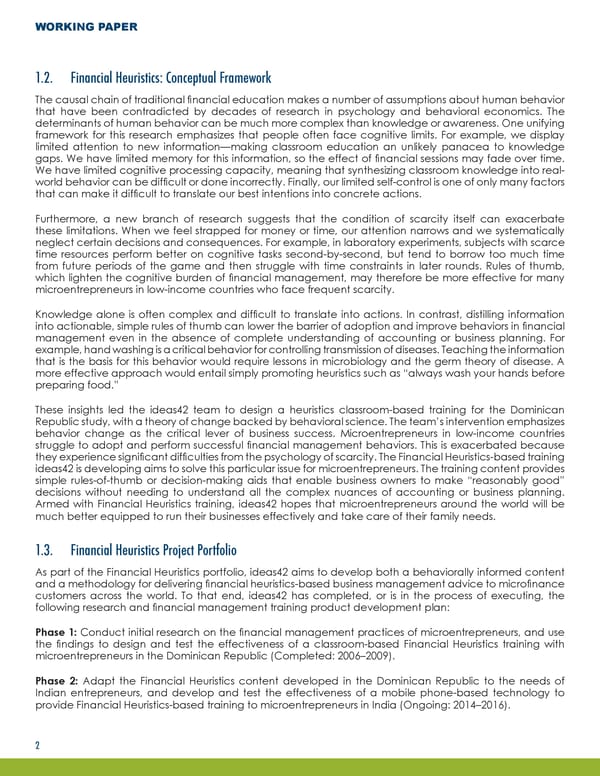WORKING PAPER 1.2. Financial Heuristics: Conceptual Framework The causal chain of traditional financial education makes a number of assumptions about human behavior that have been contradicted by decades of research in psychology and behavioral economics. The determinants of human behavior can be much more complex than knowledge or awareness. One unifying framework for this research emphasizes that people often face cognitive limits. For example, we display limited attention to new information—making classroom education an unlikely panacea to knowledge gaps. We have limited memory for this information, so the effect of financial sessions may fade over time. We have limited cognitive processing capacity, meaning that synthesizing classroom knowledge into real- world behavior can be difficult or done incorrectly. Finally, our limited self-control is one of only many factors that can make it difficult to translate our best intentions into concrete actions. Furthermore, a new branch of research suggests that the condition of scarcity itself can exacerbate these limitations. When we feel strapped for money or time, our attention narrows and we systematically neglect certain decisions and consequences. For example, in laboratory experiments, subjects with scarce time resources perform better on cognitive tasks second-by-second, but tend to borrow too much time from future periods of the game and then struggle with time constraints in later rounds. Rules of thumb, which lighten the cognitive burden of financial management, may therefore be more effective for many microentrepreneurs in low-income countries who face frequent scarcity. Knowledge alone is often complex and difficult to translate into actions. In contrast, distilling information into actionable, simple rules of thumb can lower the barrier of adoption and improve behaviors in financial management even in the absence of complete understanding of accounting or business planning. For example, hand washing is a critical behavior for controlling transmission of diseases. Teaching the information that is the basis for this behavior would require lessons in microbiology and the germ theory of disease. A more effective approach would entail simply promoting heuristics such as “always wash your hands before preparing food.” These insights led the ideas42 team to design a heuristics classroom-based training for the Dominican Republic study, with a theory of change backed by behavioral science. The team’s intervention emphasizes behavior change as the critical lever of business success. Microentrepreneurs in low-income countries struggle to adopt and perform successful financial management behaviors. This is exacerbated because they experience significant difficulties from the psychology of scarcity. The Financial Heuristics-based training ideas42 is developing aims to solve this particular issue for microentrepreneurs. The training content provides simple rules-of-thumb or decision-making aids that enable business owners to make “reasonably good” decisions without needing to understand all the complex nuances of accounting or business planning. Armed with Financial Heuristics training, ideas42 hopes that microentrepreneurs around the world will be much better equipped to run their businesses effectively and take care of their family needs. 1.3. Financial Heuristics Project Portfolio As part of the Financial Heuristics portfolio, ideas42 aims to develop both a behaviorally informed content and a methodology for delivering financial heuristics-based business management advice to microfinance customers across the world. To that end, ideas42 has completed, or is in the process of executing, the following research and financial management training product development plan: Conduct initial research on the financial management practices of microentrepreneurs, and use Phase 1: the findings to design and test the effectiveness of a classroom-based Financial Heuristics training with microentrepreneurs in the Dominican Republic (Completed: 2006–2009). Phase 2: Adapt the Financial Heuristics content developed in the Dominican Republic to the needs of Indian entrepreneurs, and develop and test the effectiveness of a mobile phone-based technology to provide Financial Heuristics-based training to microentrepreneurs in India (Ongoing: 2014–2016). 2
 Using Behavioral Science to Design a Customer-Centric Financial Management Training for Microentrepreneurs Page 4 Page 6
Using Behavioral Science to Design a Customer-Centric Financial Management Training for Microentrepreneurs Page 4 Page 6